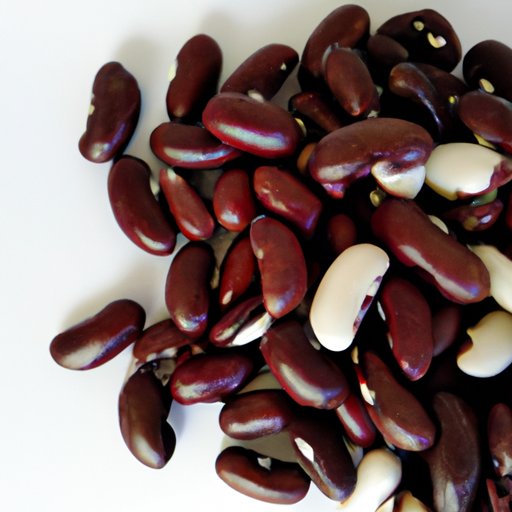Introduction
Beans are one of the most widely consumed foods in the world. They are packed with nutrients, including protein, fiber, vitamins, and minerals. But are they good for you? This article will explore the potential health benefits and risks of eating a bean-rich diet.

Examining the Nutritional Benefits of Beans
Beans are an excellent source of nutrition. A cup of cooked black beans, for example, contains 15 grams of protein, 15 grams of fiber, and a variety of vitamins and minerals, including iron, magnesium, and folate. Eating beans can help you meet your daily nutritional needs and improve your overall health.
Beans are also high in antioxidants, which can help reduce inflammation and protect against disease. According to a study published in the journal Nutrients, “Antioxidants present in beans may play a role in reducing the risk of chronic diseases such as cardiovascular disease, diabetes, and certain cancers.”
In addition to providing essential nutrients, eating beans can help you feel fuller for longer. A study published in the American Journal of Clinical Nutrition found that people who ate a meal containing beans reported feeling fuller than those who ate a meal without beans. This could be beneficial if you’re trying to lose weight or maintain a healthy weight.
Finally, beans are incredibly versatile and can be enjoyed in a variety of dishes. Some healthy bean recipes include black bean tacos, lentil soup, and chickpea curry. These dishes can make it easier to incorporate beans into your diet.

Exploring the Health Risks of Eating Too Many Beans
While there are many potential health benefits associated with eating beans, it is important to note that eating too many beans can have some negative side effects. For example, beans contain compounds called phytates, which can interfere with the absorption of certain minerals, such as iron and zinc. Additionally, beans are high in fiber, which can cause digestive distress if eaten in large amounts.
It is also important to note that some people may experience an allergic reaction to certain types of beans. Symptoms of a bean allergy can include nausea, vomiting, abdominal pain, and difficulty breathing. If you suspect that you are allergic to beans, it is important to speak to your doctor.
To avoid these potential risks, it is important to monitor your intake of beans. The American Heart Association recommends eating four servings (1/2 cup each) of beans per week. This should provide enough nutrients to benefit your health without overdoing it.
Analyzing the Pros and Cons of a Bean-Rich Diet
When deciding whether to eat a bean-rich diet, it is important to consider both the potential benefits and drawbacks. On the plus side, eating beans can provide essential nutrients, reduce inflammation, and even help you lose weight. On the other hand, eating too many beans can lead to digestive issues and interfere with mineral absorption.
Ultimately, the decision to eat a bean-rich diet should be based on your individual needs and preferences. If you have any concerns, it is always best to speak to a healthcare professional before making any changes to your diet.

Investigating the Different Types of Beans and Their Effects on Your Health
There are many different types of beans, ranging from black beans and kidney beans to chickpeas and lentils. While all beans offer some health benefits, there are some differences in their nutrient content. For example, black beans are higher in protein than kidney beans, while chickpeas are higher in fiber.
It is also important to note that some types of beans may pose more health risks than others. Soybeans, for instance, contain compounds called isoflavones, which can interfere with hormone levels. It is best to consult your doctor before adding soybeans to your diet.
Dissecting the Popular Beliefs About Beans and Health
There are many popular beliefs about the health benefits and risks of eating beans. Unfortunately, not all of these beliefs are backed by scientific evidence. For example, while eating beans can provide some health benefits, there is no evidence that they can cure cancer or prevent heart disease.
It is also important to note that many of these beliefs are based on outdated information. For example, some people believe that soaking beans before cooking them reduces their nutritional value. However, a study published in the Journal of Food Science found that soaking beans does not significantly affect their nutrient content.
Conclusion
Overall, beans can be a nutritious addition to your diet. They are packed with essential nutrients, including protein, fiber, and vitamins and minerals. Eating beans can also help you feel fuller for longer and may reduce the risk of certain diseases. However, it is important to note that eating too many beans can lead to digestive problems and interfere with mineral absorption.
When deciding whether to eat a bean-rich diet, it is important to consider both the potential benefits and drawbacks. Ultimately, the decision should be based on your individual needs and preferences. If you have any concerns, it is always best to speak to a healthcare professional before making any changes to your diet.
(Note: Is this article not meeting your expectations? Do you have knowledge or insights to share? Unlock new opportunities and expand your reach by joining our authors team. Click Registration to join us and share your expertise with our readers.)
